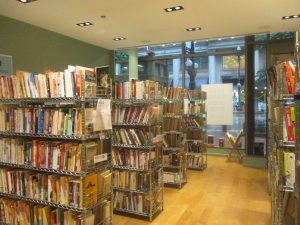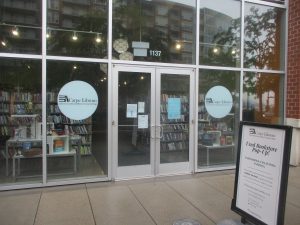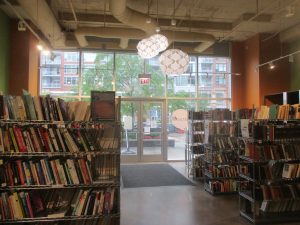Downtown Chicago used bookstores raise money for West Side schools
By Igor Studenkov For Chronicle Media — July 31, 2018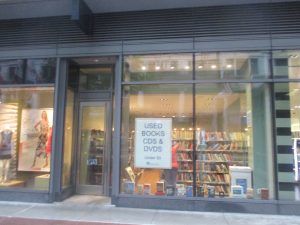
Carpe Librum’s Block 37 location, which recently moved from the pedway level to street level on the State Street side of the complex. (Photo by Igor Studenkov/for Chronicle Media)
Downtown Chicago is home to several bookstores.
The Barnes & Noble bookstore chain has a location near the intersection of Jackson and State streets. Curbside Books and Records, which focuses on books published by smaller-scale, independent publishers, is located a bit farther west, inside the Revival Food Hall (125 S. Clark St). And, as previously reported by the Chronicle, the Dial bookstore has been selling a mix of new and used books out of the iconic Fine Arts Building since last November.
But Carpe Librum pop-up bookstores carved out a niche of their own. They are operated by Turning the Page, an organization that works to help parents and teachers improve students’ educational experiences. The bookstores sell donated books, records, CDs and DVDs for under $5 each, and all of the money goes to support Turning the Page’s programs in Chicago West Side’s North Lawndale neighborhood.
There are currently three Carpe Librum bookstores — one on the State Street Block 37 shopping center, one on the lower level of the Thompson Center and one in South Loop’s Roosevelt Collection shopping center.
Jason King, the nonprofit’s president and CEO, told the Chronicle that he sees it as a win-win — they get to raise money while providing cheap books in major retail locations, and the property owners appreciate that storefronts get use. Still, the arrangement isn’t permanent — though King hopes that the bookstores would be able to stay open for years to come.
Turning the Page was founded in 1998 by a group of young professionals living in Washington D.C — a group that included King. As he explained, the city schools had “great need” and they wanted to try to do something about it. Their first project was to raise money to buy books for Shadd Elementary School library. It was successful, and the group wanted to do more.
After researching the issue and talking to parents, school librarians, teachers and education-orientated community groups, they focused on what would become the organization’s two founding principles — helping parents get involved in their kids’ education and ensuring kids have books, supplies and other learning materials they would need to do well in schools.
“We thought it would be an opportunity for us to fill the gap and bring parents into school live [and do] the kinds of things par schools weren’t able to prioritize,” King said.
Turning the Page does it in several ways. It organizes community nights, where parents take part in educational workshops and get three books. In many cases, the nonprofit is able to arrange for author visits during those events. It provides leadership training for parents, work with teachers to help them engage with parents and the community and generally ensuring students and parents get books and other resources they need to learn better.
King said that, he’s been running Turning the Page since July 2000, when he decided to give up his career as an attorney to commit to the nonprofit full-time.
In the fall of 2014, Kipp Foundation, which operates multiple charter schools throughout Chicago, invited Turning the Page to work with them in North Lawndale. The foundation operates two schools in the neighborhood — Kipp Ascend Primary School for students in grades K-4 and Kipp Ascend Middle School for students in grades 5-8. The schools have been taking part in the broader North Lawndale Reads community initiative, and they wanted Turning the Page to get involved as well.
In the first half of the 20th century, North Lawndale was a bustling working-class community. Sears built its original campus in the neighborhood, becoming its biggest employer, and a number of factories, warehouses and other businesses opened up as well. But in the 1950s-1970s, the neighborhood went through a series of upheavals as population shifted from majority-white to majority-black.
According to the Chicago History Museum’s Encyclopedia of Chicago, many of the white residents who moved out continued to working for local industrial businesses, and the new African-American residents struggled to find jobs. This meant that fewer people were spending money in the neighborhood. The riots that erupted in the wake of Martin Luther King Jr.’s assassination convinced many businesses to leave.
Over the next decade, the major local employers either moved out or closed. Sears moved its headquarters downtown in 1974 and, by 1987, left the neighborhood entirely. While there have been efforts to revive North Lawndale— most notably, through redevelopment of the former Sears campus — the results have been mixed.
King said that Turning the Page started with a pilot that ran through the 2014-15 school year. In the summer of 2015, they opened an office in Nichols Tower — the 14-story structure that, as part of the original Sears campus, was known as the original Sears Tower. As of start of the 2015-16 school year, the programs became permanent.
Today, Turning the Page offers the same programs as it does in Washington D.C. As of the 2017-18 school year, it works with six North Lawndale schools — four charter schools, a magnet public school and one neighborhood public school. According to its website, the schools are chosen based on “engaging families, the capacity of their staff to support parent leadership and advocacy efforts,” and all schools have at least 90 percent of the students qualify for free breakfast and lunch.
King said that, as in Washington D.C., the idea is to establish partnerships that last.
“We are trying to create long-term relationships with schools, with parents [and] with kids, so we partner with schools on ongoing basis,” he said.
By the time it came to Chicago, Turning the Page has already been using pop-up bookstores to raise money in Washington D.C. since 2002. It currently has two pop-up bookstores in the capital — one in Washington Union Station and one in Mazza Gallerie shopping center. As King explained, the concept benefitted everyone involved — the donors can get rid of the books they don’t need but don’t want to throw away, the shoppers can take advantage of cheap prices and Turning the Page could raise money while putting books and other materials into people’s hands.
“It’s a win-win,” he said. “We’re able to support our work and able to provide a service to the community.”
As Turning the Page’s website explains, the name “Carpe Librum” means “seize the book,” a play on a Latin phrase “carpe diem,” which means “seize the day.”
King mentioned that they opened a pop-up store in Portage Park neighborhood’s Six Corners commercial area in 2016, but that has since closed. The first downtown pop-up store was something that came about thanks to the Chicago Loop Alliance community organization, which introduced them to the owners of the Block 37 retail and entertainment complex.
“Chicago Loop Alliance has been a wonderful partner,” King said. “They really see value of activating space, the space in the community.”
The owners offered a vacant space at the Block 37 section of the pedway network — the system of underground and above-ground passages that link together many government, commercial and residential buildings throughout northeastern part of downtown. The space was located near the escalators and elevators leading to the building’s higher levels, and within full view of commuters and other pedestrians using the system. The Block 37 Carpe Librum officially opened on May 30, 2017.
Block 37 staff connected Turning the Page to the operators of Roosevelt Collection shops in the South Loop neighborhood, which offered them a space east of the main driveway, at 1137 S. Delano Court East. That store opened in December 2017. In February 2017, a third Chicago Carpe Librum opened in the Atrium Mall, which is located on the pedway level at Thompson Center.
Most recently, the Block 37 store moved from the pedway up to State Street, in the space about midway between Washington and Randolph streets. While the space is slightly smaller, it is more visible to casual passersby who may not use the pedway.
Because the inventory of each store is based on donations and all three stores accept donations on the spot, the books that are on sale can vary dramatically. And, as sales clerks noted to the Chronicle, this means that the selection doesn’t stay the same for long.
King noted that the three stores received approximately 50,000 in donated materials — not as much as the aproximately 500,000 collected in Washington D.C. stores, but he said that donations to the Chicago stores are growing.
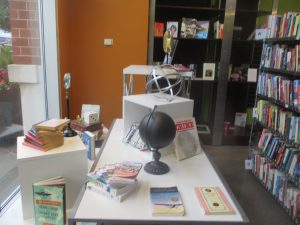
A window book display at Carpe Librum’s Roosevelt Collection location. (Photo by Igor Studenkov/for Chronicle Media)
All of the sales clerks are volunteers, so the proceeds from the sales go directly to Turning the Page. King said that those proceeds account for about 30 percent of the organization’s funding.
Because the stores are pop-ups as opposed to more permanent tenants, their long-term future is uncertain. King said that, if there is an opportunity to pursue something more permanent, they will — but if not, they will make the best of what they can get.
“We’re open to more a more permanent space, and we’re open to doing festivals,” he said. “If we opt to find more permanent space, we want to explore that. Pop-ups work as well. They provide opportunities to be in the neighborhood.”
Would Turning the Page be open to do more pop-ups?
“I think as [opportunities] presents themselves, we could,” King replied. ‘“Right now, [the current three locations] are what we’re focusing on. [But] if there’s an opportunity, we’d be thrilled to explore it, absolutely.”
For more information about Carpe Librum locations and hours of operations, see: http://turningthepage.org/what-we-do/book-donations-in-chicago/
Get your free subscription of the Cook County digital edition
—- Downtown Chicago used bookstores raise money for West Side schools —

